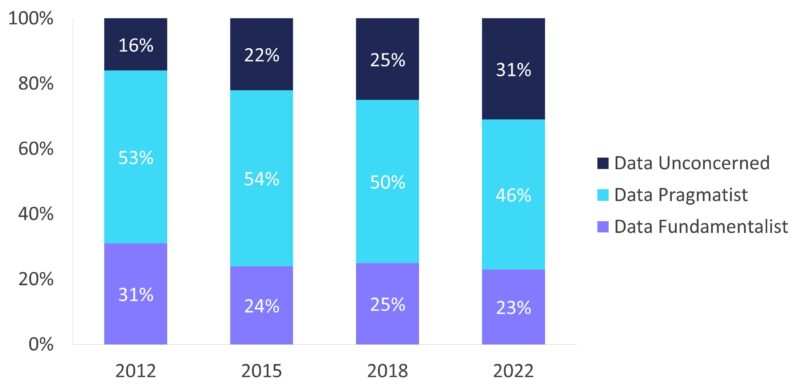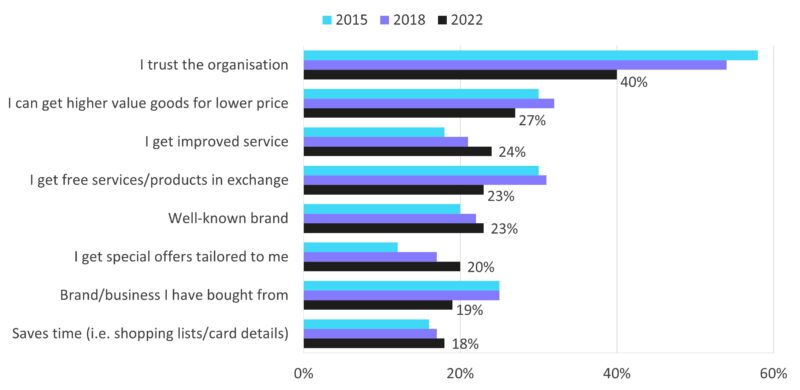Consumers increasingly comfortable sharing data
Trust and transparency remain fundamental drivers
In the modern data-driven economy, businesses need people to share their data. Marketers need to understand what makes their audience tick and be willing to share.
But how important is trust in the data exchange? How do attitudes to data sharing differ across international borders and between age groups?
New research shows people increasingly understand the benefits of sharing their data; a clear value-exchange has never been more important. Younger people are shown to have less privacy concerns than older generations.
These are just some of the findings of the ‘Global Data Privacy: What the Consumer Really Thinks 2022’ research report. The report represents 28 marketing associations whose reach stretches to more than half the world’s population – including the UK Data & Marketing Association (DMA). The latest findings build on previous studies, giving us trends useful over the past decade.
Here are some key points from the global and UK-specific reports.
Rise of the ‘unconcerned’
The research categorises people into three groups:
- Data unconcerned – people who have little or no concerns about their data privacy. The UK report shows a notable rise in this group, almost doubling over the past decade from 16% in 2012 to 31% in the latest study. So nearly a third of consumers are not unduly concerned about their privacy.
- Data pragmatists – people who are happy to share data with businesses as long as there’s a “clear benefit in doing so”. This group still makes up the largest group of consumers, but has declined in the past decade from 53% to 46%.
- Data fundamentalists – People who are unwilling or highly cautious about sharing their personal information. This group is in decline reducing in the past decade from 31% to 23%.
The chart below illustrates UK trends over the last 10 years:
Younger people are most comfortable sharing their data
Growing numbers of consumers claim to feel more comfortable with the idea of exchanging personal information with companies, although there’s a significant variation across age groups.
Younger people (18-44) are most likely to feel comfortable sharing data. However those aged 55+ have actually become less comfortable sharing data.
Trust and transparency remain fundamental
Trust in an organisation remains the most important factor driving consumer willingness to share personal information. This comes significantly above factors such as product/service benefits, price and value perceptions.
The chart below shows UK trends for the factors driving consumers to share their data:
Consumers continue to seek transparency. Today, 77% of global consumers claim that transparency around how their data is collected and used is important to them.
Industry is still seen to benefit more than consumers from the data economy
The majority of consumers globally see data exchange as essential for the running of society. Over half (53%) of consumers across all markets agreed ‘the exchange of personal information is essential for the smooth running of modern society’.
However, consumers globally continue to believe that industry benefits more than they do from data sharing, despite a small shift towards greater value being perceived by consumers. On average (across the 10 trended markets) 71% of consumers believe that ‘industry benefits more from data sharing’. In general, younger people tend to be more likely to understand and recognise the benefits from sharing their data.
This suggests we still have a long way to go to truly enable consumers to fully realise the benefits from sharing their data, or they could see this as an unfair trade.
Importance of the data exchange
The findings once again illustrate the importance of the data exchange – the moment when businesses request or otherwise collect personal data from individuals. Whilst increasingly many consumers understand the intrinsic value of their data, they want easy access to clear information about how their data will be used and need to understand what product, service or value benefits they’ll get from sharing it.
The age profile of your customers is crucial here. It’s clear businesses need to work hard to win trust and provide clear information for older age groups.
Alex Hazell, Head of Privacy and Legal at Acxiom (the DMA’s UK research partner):
‘We must drive home the value exchange between brands and people – in other words, strive harder to help people understand what they receive in return for sharing their data. For marketers, we must continue to make that value clear, whether it’s in more straightforward scenarios like relevant discounts and offers, or in more complex processing such as cross domain personalised experiences that surprise and delight.’
Concerns about online privacy remain, although reduced
As the digital economy has expanded and matured, more and more consumers are engaging with online data exchange. The proportion of UK consumers who claim to have ‘high levels of concerns’ about online privacy has fallen to 69%.
Younger consumers want to support smaller businesses
The role data sharing can play in driving more competitive economies is a compelling reason for many UK consumers to share personal information. 52% of UK consumers stated they would be more likely to exchange personal data to provide a competitive advantage to smaller companies. This sentiment was most pronounced for the under 45s.
DMA Chief Executive, Chris Combemale gave a summary the UK findings:
‘Overall, concern with data privacy is in decline, while the levels of happiness with the amount of data shared and comfort with the notion of data exchange are on the rise. In addition, public awareness and understanding of the role that data exchange plays in the modern digital economy has increased dramatically since 2012.’
“As the UK’s digital economy, alongside digital markets around the world, continue to advance and mature, there has been an increase in public ease and engagement with data sharing and the digital world. Younger people are digital natives – this is reflected in both their willingness to share data and acceptance of its importance to modern society.”
The times they are a changin’
The research highlights some interesting trends. You can read more detail in the Global report or UK report.
While consumers may be increasingly comfortable with sharing their data, it’s clear they’re most likely to do this with brands they trust, who’ve been upfront and honest about how they handle personal information and clearly demonstrate the benefits of the data exchange.





